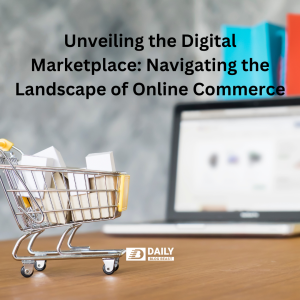Introduction:
Online marketplaces have become the cornerstone of modern commerce, revolutionizing the way we buy and sell goods and services. Platforms such as these connect buyers and sellers across the globe, providing a virtual space where transactions occur seamlessly. The rise of online marketplaces has transformed traditional retail and opened up new opportunities for businesses and consumers alike.
Offers and Discounts:
One of the critical advantages of online marketplaces is the convenience they offer. The Internet is becoming an increasingly important way for consumers to fulfill their shopping needs. The online market provides users with a one-stop shop where they can browse through a variety of products and services without having to leave the house. Convenience has played a significant role in Amazon’s success, eBay’s success, and Alibaba’s success.
The diversity of products available on online marketplaces is staggering. With everything from electronics and clothing to handmade crafts and collectibles, these platforms cater to a wide range of consumer interests. This diversity is a result of the global nature of online marketplaces, where sellers can reach a massive audience, and buyers can access an unparalleled variety of goods. This not only benefits consumers by providing them with extensive choices but also empowers small businesses and individual sellers to compete on a global scale.
In addition to the vast selection, competitive pricing is another hallmark of online marketplaces. The intense competition among sellers on these platforms often leads to lower prices, benefiting consumers who have the chance to compare prices and discover the top deals available. Price transparency and the ability to read reviews from other buyers further enhance the shopping experience, allowing consumers to make informed decisions.
Online Education:
The concept of the online marketplace extends beyond just tangible goods. Services such as freelance work, online courses, and digital downloads are also flourishing in this digital ecosystem. Platforms like Upwork and Fiverr connect freelancers with clients seeking their skills, while marketplaces like Udemy and Coursera offer a plethora of online courses. This shift towards the digital marketplace for services has created new opportunities for remote work and skill development, fostering a global community of freelancers and learners.
Developing a sense of trust is crucial for the success of online marketplaces. To facilitate trust between buyers and sellers who may be geographically distant, these platforms often implement robust review and rating systems. Buyers can leave feedback based on their experiences, helping future customers make informed decisions. Similarly, sellers with positive reviews build a reputation for reliability and quality, establishing trust in the online marketplace ecosystem.
E-commerce giants aren’t the only players in the online marketplace game. Niche marketplaces have emerged, catering to specific interests or demographics. Platforms like Etsy focus on handmade and unique items, while StockX specializes in the resale of sneakers and streetwear. These niche marketplaces provide a targeted and curated experience for users with specific interests, creating a sense of community within the platform.
Electronic & Mobile Retail:
The symbiotic relationship between mobile technology and online marketplaces has revolutionized commerce. With smartphones as constant companions, users effortlessly access virtual marketplaces, reshaping the retail landscape. Mobile apps streamline browsing, purchasing, and order tracking, providing on-the-go convenience. This accessibility fuels the widespread adoption of online marketplaces, transcending demographics. As technology advances, the synergy between mobile devices and digital marketplaces promises continued innovation, potentially introducing immersive experiences and personalized interactions. The inseparable bond between mobile technology and online marketplaces continues to redefine how we shop and sell in the digital age.
Despite the numerous benefits, online marketplaces also face challenges. Issues such as counterfeit products, fraud, and data security concerns have emerged as potential pitfalls. Marketplace operators invest heavily in security measures and algorithms to combat these challenges and ensure a safe and secure environment for users.
Looking ahead, the future of online marketplaces is likely shaped by advancements in technology such as artificial intelligence and blockchain. These technologies have the potential to enhance security further, streamline transactions, and personalize the shopping experience. Virtual and augmented reality may also play a role in creating immersive online shopping experiences, allowing users to virtually try on clothing or visualize products in their own spaces.
The nexus of technology and marketplaces is a transformative force in commerce. Advancements like AI, blockchain, and augmented reality redefine the consumer experience. AI algorithms enhance security, personalization, and streamline transactions. Blockchain ensures transparent and secure transactions, fostering trust. Augmented reality offers immersive product experiences, reshaping how users interact with digital storefronts. This tech-marketplace alliance facilitates global connectivity, allowing businesses and consumers to transcend geographical constraints. The dynamic interplay of technology and marketplaces heralds an era of innovation, propelling e-commerce into new realms of efficiency, security, and user engagement.
Conclusion:
In conclusion, online marketplaces have become integral to the way we buy and sell in the digital age. Their convenience, diversity, and competitive pricing have reshaped the retail landscape, empowering both consumers and sellers. As technology continues to advance, the evolution of online marketplaces is poised to bring about new possibilities, making the future of e-commerce an exciting and dynamic frontier.


